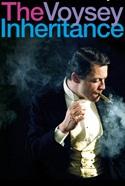Voysey Inheritance
Middle class respectability and what is still frequently referred to as a 'victimless crime' are put under the microscope in this exquisitely impressive revival of Harley Granville Barker's play 'The Voysey Inheritance', first performed in 1905, and brilliantly directed here by Peter Gill.
What this scrutiny reveals is a family living in well-healed suburbia on earnings obtained through the fraudulent use of other people's cash. Most of the Voysey family are initially blissfully ignorant of the source of their comfort and wealth, until the day when Mr Voysey senior shares his criminal secret with his partner/ son Edward, effectively passing on a sweetly-poisoned inheritance that he was also bequeathed by his father some years before.
Seemingly honest, Edward's first thought is to 'right wrongs', but it's not going to be as simple as that. Because once Voysey senior passes over to the fraudulent beyond, and Edward duly informs his kin of the crime his father has perpetrated, the reaction from his large and close-knit family is not all that he might have expected. Essentially, Edward's family want him to continue the fraud to 'save their bacon'. And there's not much honest support either from his father's duped clients, because one of them at least also wants Edward to perpetuate the fraud in order to win back his lost capital.
Though there's a feast of exceptional ensemble acting throughout this entire piece, the audience were totally captivated with Andrew Woodall's 'booming' Major Booth Voysey, audibly warming to this domineering middle class buffoon whose posturing reassurances - 'I'm not a pompous man ...' (he is); 'I'm not a conceited man ...' (he most certainly is) - do nothing but ramp-up the audience's delight. Though Woodall steals the limelight, Dominic West's Edward provides the responsible and sensible counterpart to his blustering elder brother. But West's initially anguished portrayal subtly changes gear as he settles into his criminal role. And there's a highly significant scene with Edward's clerk Peacy (ably played by John Normington) where Edward surprisingly stamps his authority on the lower class by refusing to pay the clerk's demands for 'hush money'.
The highly watchable John Nettleton also turned in an admirable performance as Mr George Booth, Voysey senior's long term friend and duped client, and Nancy Carroll provided intelligent and beautiful charm as the subject of Edward's amorous affections.
The action for 'The Voysey Inheritance' alternates between the Voyseys' office in Lincoln's Inn and their opulent middle class home in Chislehurst. This has posed something of a problem for designer Alison Chitty, because the set changes are inevitably somewhat lengthy. But it's certainly worth the wait as the curtain goes up on the Voyseys' sumptuous dining room. Oil paintings cover almost an entire wall of this extravagant Edwardian villa - complete with billiard room and three maids no less - and one can't help wondering if these works of art have also found their way from the Voysey client vaults. Chitty's set is perfect and indeed absolutely essential in order to contrast the Voysey lifestyle with the crime that underpins it all. It's hard to see how this play could work without an impressively detailed and realistic set like this. And that applies to the large cast too, since without them we would not appreciate the sense of power and influence of this family, nor understand the nature of the dilemma they face.
Gill's elegantly savage production is simply magnificent theatre. It's a poignantly modern and refreshingly relevant production of Harely Granville Barker's intelligent and superbly-crafted play that still has sharp, though refined and subtle, teeth. It's nonetheless depressing to think that little has changed since Edwardian times. Because, as we all know, fraud is not only an easy crime to commit, it's an even easier one to cover up, as Barker's play clearly and cleverly demonstrates.
So don't anticipate any justice or redemption from 'The Voysey Inheritance', because there's really none on offer. Barker carefully wove a realistic plot that preserved the status quo nicely in tact, though leaving the door ajar for our own opinions. In the end though, the 'heroic' Edward seemingly profits from his honest dishonesty. Not a bad line of work for an unwilling fraudster.
What the popular press had to say.....
NICHOLAS DE JONGH for THE EVENING STANDARD says, "Atmospheric, exquisitely acted production, a great family drama of the British 20th century." RHODA KOENIG for THE INDEPENDENT says, "Splendidly crisp and wonderfully cast production." BENEDICT NIGHTINGALE for THE TIMES says, "Often funny." MICHAEL BILLINGTON for THE GUARDIAN says, "well-upholstered play and the acting has the in-depth quality of the National at its best...a first-rate evening." CHARLES SPENCER for DAILY TELEGRAPH says, "Wonderfully rich and satisfying play...This is a great play that finds the National at the top of its game."
External links to full reviews from popular press
The Independent
The Guardian
The Daily Telegraph
The Times
Production photo by Johan Persson
Originally published on
